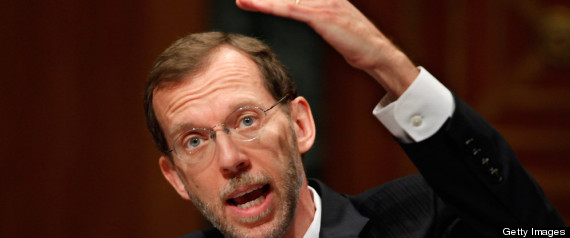One government official has some bad news for Americans and politicians: You can’t protect the middle class from tax increases or benefit cuts if you want to fix the deficit. But part of the problem lies in the definition: Basically everyone considers themselves part of the middle class.
Congressional Budget Office Director Doug Elmendorf told an audience at Harvard University that politicians’ promises to spare the middle class from tax increases and benefit cuts will be tough to keep, if the country ever tackles its debt problem head on.
“Putting the debt on a sustainable path will ultimately require increases in taxes or cuts in government benefits or services for people who consider themselves to be in the middle class,” he said, according to CNNMoney.
Though Elmendorf's comments may seem controversial, they're in line with what is actually taking place. President Obama's 2014 budget proposal included small tax increases on the middle class. In addition, lawmakers allowed the payroll tax cut to expire earlier this year, which hit middle- and low-income Americans harder than others.
Republicans insisted on a budget proposal that shies away from raising taxes.
Jared Bernstein, a former chief economic adviser to Vice President Joe Biden and a senior fellow at the Center on Budget Policy and Priorities, agreed with Elmendorf’s statements, in part arguing that a sustainable budget fix is impossible if it relies on tax increases for the top 1 to 2 percent of Americans, as the fiscal cliff agreement did.
But he told The Huffington Post that the tax increases necessary to boost revenue to sustainable levels should fall on only some of the large swath of Americans that view themselves as middle class.
“Almost everybody considers themselves middle class, it’s not that meaningful a statement to say some day we’re going to have raise taxes on middle class people,” Bernstein said. “It’s important to try to be more precise.”
What’s perhaps more important to note, Bernstein said, is that Americans are the least taxed they’ve been in 30 years, if you measure federal taxes as a share of income. That means that some Americans in the middle 40 percent of the income scale -- which ranges from about $40,000 to $100,000 should be subject to tax increases -- but it’s hard to say where that threshold should be.
“Basically you can’t just keep cutting taxes year after year and act particularly surprised when you’re short on revenue,” Bernstein said.
Original Article
Source: huffingtonpost.com
Author: Jillian Berman
Congressional Budget Office Director Doug Elmendorf told an audience at Harvard University that politicians’ promises to spare the middle class from tax increases and benefit cuts will be tough to keep, if the country ever tackles its debt problem head on.
“Putting the debt on a sustainable path will ultimately require increases in taxes or cuts in government benefits or services for people who consider themselves to be in the middle class,” he said, according to CNNMoney.
Though Elmendorf's comments may seem controversial, they're in line with what is actually taking place. President Obama's 2014 budget proposal included small tax increases on the middle class. In addition, lawmakers allowed the payroll tax cut to expire earlier this year, which hit middle- and low-income Americans harder than others.
Republicans insisted on a budget proposal that shies away from raising taxes.
Jared Bernstein, a former chief economic adviser to Vice President Joe Biden and a senior fellow at the Center on Budget Policy and Priorities, agreed with Elmendorf’s statements, in part arguing that a sustainable budget fix is impossible if it relies on tax increases for the top 1 to 2 percent of Americans, as the fiscal cliff agreement did.
But he told The Huffington Post that the tax increases necessary to boost revenue to sustainable levels should fall on only some of the large swath of Americans that view themselves as middle class.
“Almost everybody considers themselves middle class, it’s not that meaningful a statement to say some day we’re going to have raise taxes on middle class people,” Bernstein said. “It’s important to try to be more precise.”
What’s perhaps more important to note, Bernstein said, is that Americans are the least taxed they’ve been in 30 years, if you measure federal taxes as a share of income. That means that some Americans in the middle 40 percent of the income scale -- which ranges from about $40,000 to $100,000 should be subject to tax increases -- but it’s hard to say where that threshold should be.
“Basically you can’t just keep cutting taxes year after year and act particularly surprised when you’re short on revenue,” Bernstein said.
Original Article
Source: huffingtonpost.com
Author: Jillian Berman

No comments:
Post a Comment